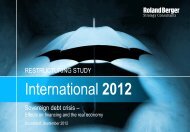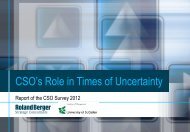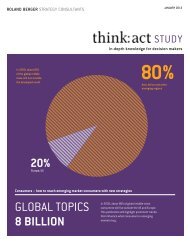issue 1 - Roland Berger
issue 1 - Roland Berger
issue 1 - Roland Berger
Create successful ePaper yourself
Turn your PDF publications into a flip-book with our unique Google optimized e-Paper software.
89.5 percent of all young chinese want to study abroad food for thought f<br />
“ For Chinese companies, global expansion may initially only<br />
mean a partial expansion into a specific foreign market.”<br />
Professor Harro von Senger<br />
TCL is engaged in a partnership strategy of<br />
global importance with the French group<br />
Thomson. Overnight the joint venture, of<br />
which TCL owns a 67 percent share, became<br />
the biggest manufacturer of consumer electronics<br />
in the world. It is aiming at producing—in<br />
Hong Kong—18 million color<br />
televisions and up to 4 million DVD players,<br />
with the technology originating in France.<br />
It is not only Western brands and Western<br />
technologies that China can build upon. The<br />
Old World’s big cities are vying to serve as<br />
bridgeheads for the future economic superpower.<br />
Hamburg (referred to in Chinese as<br />
Hanbao, “castle of the Chinese”) feels it<br />
stands a good chance of fulfilling this role,<br />
as it has already provided a branch location<br />
for 320 Chinese companies. “It is our stated<br />
objective to become Europe’s number one<br />
city in doing business with China,” says<br />
Reinhard Stuth, a councilor with the State<br />
Senate’s chancellery.<br />
The Senate has set up a Chinese-language<br />
wing at a city high school for the children of<br />
Hamburg’s 3,000 Chinese residents. And<br />
The Hochschule für Angewandte Wissenschaft,<br />
a university for applied science,<br />
has established an engineering college<br />
jointly with the University of Shanghai. The<br />
university clinic in Epperdorf plans to open<br />
an internationally significant institute for<br />
traditional Chinese medicine.<br />
CHINESE IMMIGRANTS MOVE<br />
AROUND EUROPE AS IF IT WERE A<br />
LARGE CHESSBOARD<br />
Hardly noticed by the public, some European<br />
cities such as Milan in Italy have even<br />
sprouted small Chinatowns. Chinese<br />
leatherworkers and silk-tie salesmen had already<br />
set up shop in the Via Paolo Sarpi district<br />
back in the 1930s. In fact, northern Italy<br />
has had an official Chinese trade and industry<br />
association since 1968. However, most of<br />
Italy’s 16,000-member Chinese community<br />
lives in Prato, a city near Florence built<br />
around the textile industry. Leather-processing<br />
plants in particular have drawn immigrants,<br />
many of them illegal, from Fujian<br />
and Zhejiang provinces. Yet as quickly as<br />
the Chinese community grows, it could also<br />
just as rapidly shrink if economic conditions<br />
were to become unfavorable, as they did in<br />
Prato, where more and more leather companies<br />
are closing.<br />
“Chinese immigrants consider Europe a<br />
kind of chessboard across which they can<br />
move about freely. As a result of their strong<br />
family ties and networks, they have start-up<br />
possibilities all over the continent,” says<br />
Professor Antonaella Ceccagno, head of<br />
Prato’s immigration center.<br />
While Chinese from the lower class try to<br />
make a go of it in leather manufacturing or<br />
in Asian restaurants, the middle class comes<br />
to Europe to study, especially since the<br />
drastic post-9/11 security measures have<br />
scared off enrollees in the United States.<br />
According to the national statistics office in<br />
Beijing, 89.5 percent of all young Chinese<br />
want to study abroad. In 2003, more than<br />
20,000 Chinese students were enrolled in<br />
German universities. And, looking at the <strong>issue</strong><br />
optimistically, it is possible that anyone<br />
who has studied at a European university<br />
may return as a vacationer. The numbers<br />
may back that projection. In 2003, 20.2 million<br />
people from China’s fast-growing middle<br />
and upper classes traveled abroad. Of<br />
them 300,000 went to France, Europe’s traditional<br />
travel destination.<br />
Chen Wang, head of the management board<br />
at Caissa Touristic AG, believes that the<br />
Chinese will constitute the fourth largest<br />
tourist group in the world by 2020. Many<br />
perceive the ever-growing stream of Chinese<br />
tourists, students and investors as a<br />
sign that the sleeping giant is awakening.<br />
“China’s broad impact on key indicators in<br />
all international spheres will be comparable<br />
to the global Americanization in the second<br />
half of the 20th century,” says Cremer.<br />
Chinese companies are<br />
pushing into Western<br />
markets because...<br />
p<br />
p<br />
p<br />
p<br />
p<br />
Chinese production of goods is greater than the<br />
purchasing power of Chinese consumers and<br />
their still comparatively low average income.<br />
China cannot absorb all its domestically<br />
produced goods.<br />
The principle “a bigger market is better for<br />
business” also applies to Chinese companies.<br />
Chinese companies can gain commercially<br />
useful business and other types of expertise by<br />
being internationally competitive.<br />
Global competition can help Chinese companies<br />
avoid both the hazard of becoming “inbred” and<br />
the associated inhibitors of development.<br />
Chinese companies earn foreign currency on the<br />
world market with which they can purchase<br />
expertise and technologies.<br />
(Source: Professor Harro von Senger)<br />
china’s direct investment abroad<br />
600 million dollars<br />
500<br />
400<br />
300<br />
200<br />
100<br />
90 97 98 99 00 01 02<br />
Since 1999, government-sponsored direct investment<br />
abroad has increased steadily.<br />
Source: OECD<br />
china’s globalized sectors<br />
16%<br />
8%<br />
16%<br />
20%<br />
40%<br />
Other<br />
Research & Development<br />
Sales/Marketing<br />
Production<br />
Purchasing<br />
As they expand, Chinese companies are using international<br />
partnerships to compensate for their weaknesses, primarily<br />
in sales and marketing.<br />
Source: <strong>Roland</strong> <strong>Berger</strong> Strategy Consultants<br />
03<br />
think: act 11
















